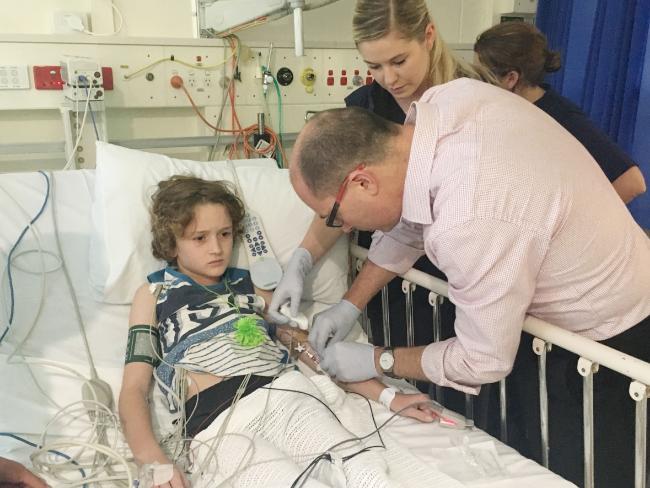Teacher’s CPR Skills Saved Nine-Year-Old Cooper Appleyard’s Life

Cooper Appleyard, aged nine, has undergone a number of tests after he collapsed at his dance concert.
COOPER Appleyard is living proof that everyone needs to know how to resuscitate a child.
Three weeks ago, the athletic nine-year-old was rehearsing for the end of year concert at his Sylvania Heights dance school. He landed a perfect no-handed cartwheel and then promptly collapsed. He had no pulse.
But one of his dance teachers, 22-year-old Danielle MacCaskell, is also a nurse and immediately started cardiopulmonary resuscitation, keeping Cooper alive until paramedics arrived.
“When I walked in, my wife was on the floor and six to eight paramedics were working on Cooper, it was unbelievable and that’s when I found out his heart had stopped,” Cooper’s father John said.
Cooper’s mother Kylie Ewan-Appleby walked in at the very moment her son fell.
“I saw his eyes were rolled back and then the nurse started CPR. Danielle was just very calm and did what she had to do. What she did saved him,” she said.
Ms MacCaskell, a nurse at St George Hospital, said it was all a bit of a blur, but her training kicked in.
“He was unconscious, I called an ambulance, then he stopped breathing and I started CPR for about five to seven minutes,” Ms MacCaskell said.
Cooper spent two days in intensive care sedated and on a ventilator as his nervous parents waited to see if their cheeky, funny son was going to pull through unscathed.
He is their third child, a delightful surprise who was naturally conceived after they had gone through IVF for their first two children.
“When he woke he knew us, he could speak and as the sedation wore off he got back to his normal self,” Mr Appleyard said.
After a multitude of tests, Cooper was diagnosed with a rare condition called Catecholaminergic Polymorphic Ventricular Tachycardia, or CPTV. It is a disorder characterised by an abnormal heart rhythm and, when coupled with too much adrenaline, can send the heart into cardiac arrest.
It is thought to be the cause of up to 15 per cent of all unexplained cardiac deaths in young people. Cooper had never shown any symptoms before.
“When I saw him sitting up in the hospital the next week, I was really relieved,” Ms MacCaskell said.
Cooper’s parents are incredibly grateful that Ms MacCaskell knew CPR. They are in no doubt she saved their son’s life.
“If he did not have that CPR, he would have died. They doctors have said that,” Mr Appleyard said.
“How do you thank someone for saving a child’s life? I’m just so grateful Danielle was there,” Mrs Ewan-Appleby said.
“I think it’s an important skill to have, everyone should be encouraged to learn CPR,” Ms MacCaskell said.
Cooper will have a defibrillator fitted into his chest. If his heart goes into cardiac arrest again, it will deliver an electrical shock to save him.
AFL player Stuart Goddard has the same device fitted in his chest and Belgian soccer player Anthony Van Loo has the same condition and he made world news when he went into cardiac arrest midgame and his ICD restarted his heart.
Story Credit: https://www.dailytelegraph.com.au/news/nsw/teachers-cpr-skills-saved-nineyearold-cooper-appleyards-life/news-story/2645d10c3a5e69830a044509849817df


